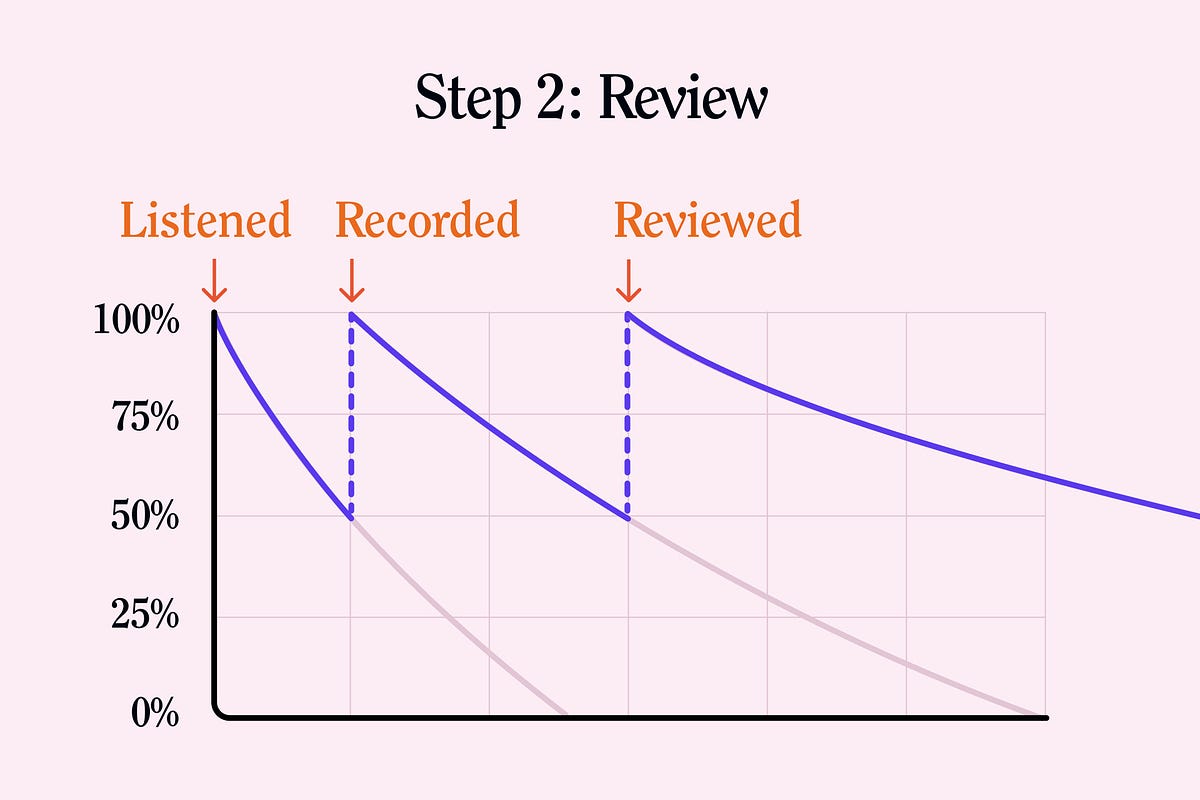insight - Software Development - # Leveraging Voice-to-Text Apps to Enhance Podcast Retention and Comprehension
How to Effectively Remember and Apply Insights from Podcasts Using Voice-to-Text Technology
Core Concepts
Using voice-to-text apps to create structured notes and reflections on podcast content can significantly improve memory retention, knowledge integration, and the ability to apply key insights.
Abstract
The author shares a simple yet effective method for remembering and applying insights from podcasts. The key steps are:
After listening to a podcast, use a voice-to-text app (like the author's own app, Letterly) to record your thoughts and reflections on the content.
The app will convert your spoken words into structured, readable text, allowing you to review and refine your notes.
This active process of verbalizing and elaborating on the podcast content engages two powerful learning techniques: active recall and elaborative interrogation.
Active recall strengthens neural connections by requiring you to retrieve information from memory, while elaborative interrogation helps integrate new knowledge with your existing understanding.
The author emphasizes that this method is almost effortless to incorporate into your daily routine, as you can create notes while driving, doing chores, or in other situations where you typically listen to podcasts.
Beyond just improving memory retention, this approach can also enhance creativity, critical thinking, and the ability to articulate your thoughts more effectively.
The author encourages readers to try this method with various types of content, including podcasts, videos, books, and study materials, to become a more thoughtful and engaged learner.
How I Remember What Matters Most from Podcasts — No Notes Needed
Stats
"Thinking aloud enhances memory retention and allows you to identify knowledge gaps. More importantly, it helps integrate new insights into your existing knowledge, ensuring you don't forget the most important lessons."
"A structured text of your reflections on podcasts helps you understand and remember them better. Quickly reviewing these notes engages your visual memory."
"Active recall is a learning technique that involves actively stimulating memory retrieval to enhance and consolidate learning."
"Elaborative interrogation complements active recall by encouraging deeper cognitive processing. It is the process of explaining why and how certain facts or concepts work."
Quotes
"The key is its simplicity. Once the podcast ends, simply speak into your headphones and revisit your notes whenever you want."
"Shifting from passive content consumption to active engagement will help not only in remembering what matters but also in: Improving creativity, Developing critical thinking, Articulating your thoughts better."
Key Insights Distilled From
by Anton Lebede... at medium.com 04-18-2024
https://medium.com/practice-in-public/how-i-remember-what-matters-most-from-podcasts-no-notes-needed-259dfa30e0bc
Deeper Inquiries
How could this method be adapted to improve retention and application of insights from other types of media, such as books or online courses?
To adapt this method for other types of media like books or online courses, one could utilize voice-to-text technology to transcribe key points or reflections while engaging with the material. By verbally expressing thoughts and insights gained from reading a book or completing an online course, individuals can enhance memory retention and understanding. This method can be particularly useful for summarizing complex concepts, highlighting important information, and connecting new knowledge with existing understanding. Additionally, incorporating active recall and elaborative interrogation techniques while using voice-to-text technology can further solidify learning and facilitate the application of insights across various forms of media.
What potential limitations or drawbacks might exist in relying solely on voice-to-text technology for note-taking and reflection, and how could these be addressed?
While voice-to-text technology offers convenience and efficiency in capturing thoughts and reflections, there are potential limitations to consider. One drawback is the accuracy of transcription, as errors in converting spoken words to text may lead to misunderstandings or misinterpretations of the original content. To address this, individuals can review and edit the transcribed text for accuracy before further processing or reflection. Another limitation is the lack of non-verbal cues and context that may be present in traditional note-taking methods, which could impact the depth of understanding or emotional connection to the material. To mitigate this, users can supplement voice-to-text notes with additional annotations, visual aids, or personal reflections to provide a more comprehensive record of their learning experience.
How might this approach to podcast engagement be integrated with other learning strategies or productivity tools to create a more comprehensive system for knowledge management and personal development?
Integrating this approach to podcast engagement with other learning strategies and productivity tools can enhance knowledge management and personal development. For example, combining voice-to-text notes with spaced repetition techniques can reinforce learning over time and improve long-term retention of information. Additionally, incorporating these audio reflections into a digital note-taking system or knowledge management platform allows for easy organization, searchability, and retrieval of insights across various topics and sources. Furthermore, leveraging task management tools or goal-setting frameworks alongside audio notes can help individuals track their progress, set learning objectives, and apply newfound knowledge in practical ways. By creating a holistic system that integrates podcast engagement with complementary learning strategies and productivity tools, individuals can optimize their learning experience, enhance critical thinking skills, and foster continuous personal growth.
0
